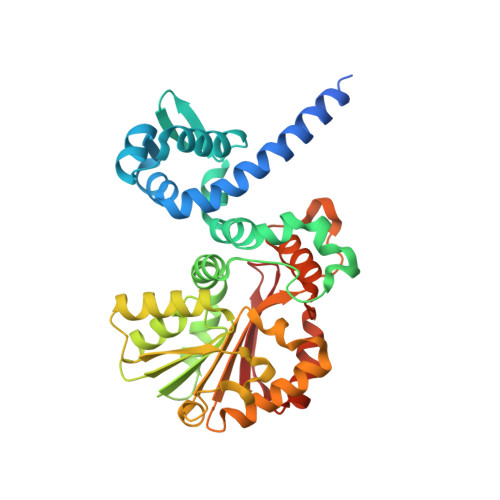Structure and mechanism of a nonhaem-iron SAM-dependent C-methyltransferase and its engineering to a hydratase and an O-methyltransferase
Zou, X.W., Liu, Y.C., Hsu, N.S., Huang, C.J., Lyu, S.Y., Chan, H.C., Chang, C.Y., Yeh, H.W., Lin, K.H., Wu, C.J., Tsai, M.D., Li, T.L.(2014) Acta Crystallogr D Biol Crystallogr 70: 1549-1560
- PubMed: 24914966
- DOI: https://doi.org/10.1107/S1399004714005239
- Primary Citation of Related Structures:
4KIB, 4KIC, 4KIF, 4KIG, 4M6X, 4M6Y, 4M71, 4M72, 4M73, 4M74 - PubMed Abstract:
In biological systems, methylation is most commonly performed by methyltransferases (MTs) using the electrophilic methyl source S-adenosyl-L-methionine (SAM) via the S(N)2 mechanism. (2S,3S)-¦Â-Methylphenylalanine, a nonproteinogenic amino acid, is a building unit of the glycopeptide antibiotic mannopeptimycin. The gene product of mppJ from the mannopeptimycin-biosynthetic gene cluster is the MT that methylates the benzylic C atom of phenylpyruvate (Ppy) to give ¦ÂMePpy. Although the benzylic C atom of Ppy is acidic, how its nucleophilicity is further enhanced to become an acceptor for C-methylation has not conclusively been determined. Here, a structural approach is used to address the mechanism of MppJ and to engineer it for new functions. The purified MppJ displays a turquoise colour, implying the presence of a metal ion. The crystal structures reveal MppJ to be the first ferric ion SAM-dependent MT. An additional four structures of binary and ternary complexes illustrate the molecular mechanism for the metal ion-dependent methyltransfer reaction. Overall, MppJ has a nonhaem iron centre that bind, orients and activates the ¦Á-ketoacid substrate and has developed a sandwiched bi-water device to avoid the formation of the unwanted reactive oxo-iron(IV) species during the C-methylation reaction. This discovery further prompted the conversion of the MT into a structurally/functionally unrelated new enzyme. Through stepwise mutagenesis and manipulation of coordination chemistry, MppJ was engineered to perform both Lewis acid-assisted hydration and/or O-methyltransfer reactions to give stereospecific new compounds. This process was validated by six crystal structures. The results reported in this study will facilitate the development and design of new biocatalysts for difficult-to-synthesize biochemicals.
Organizational Affiliation:
Genomics Research Center, Academia Sinica, Taipei 115, Taiwan.






















